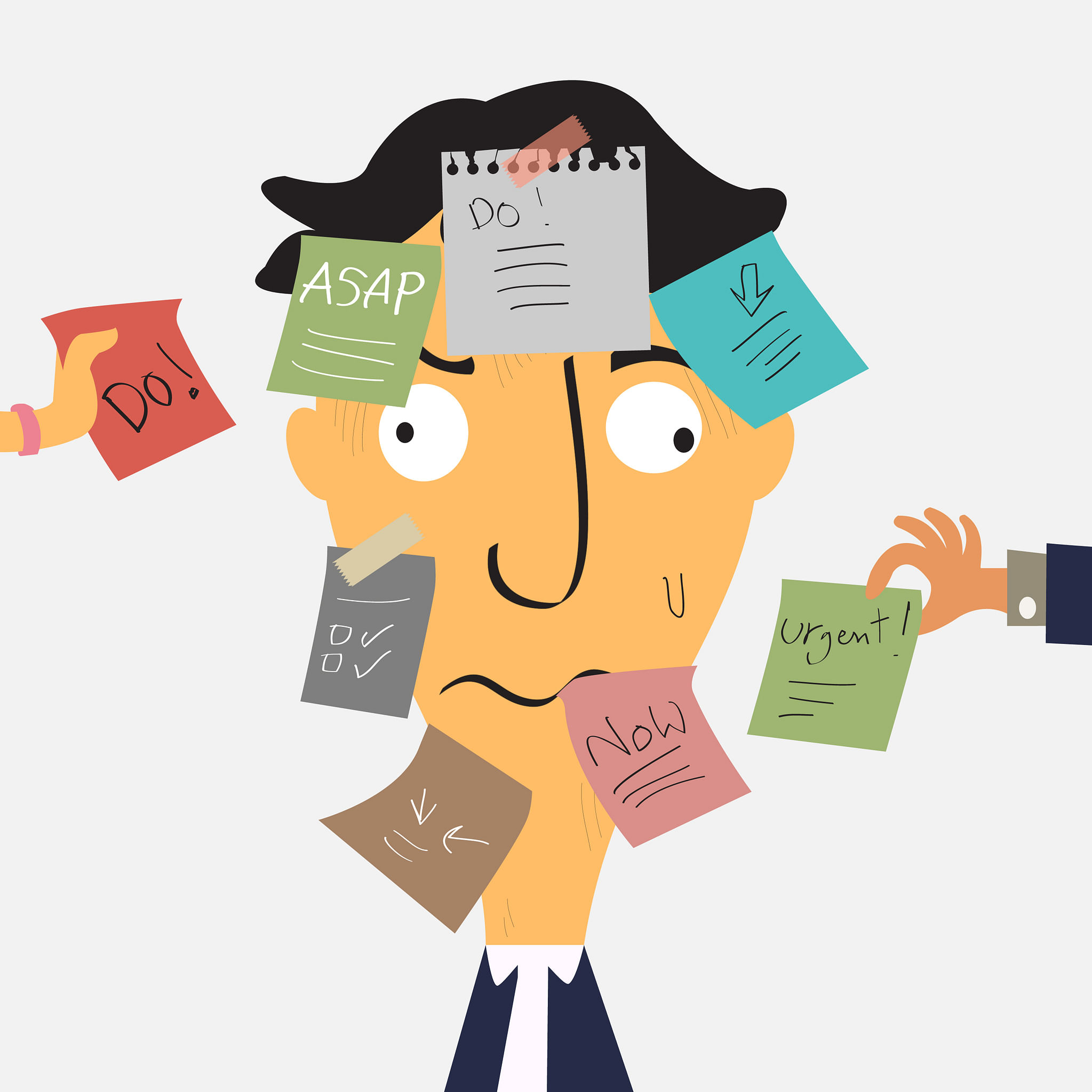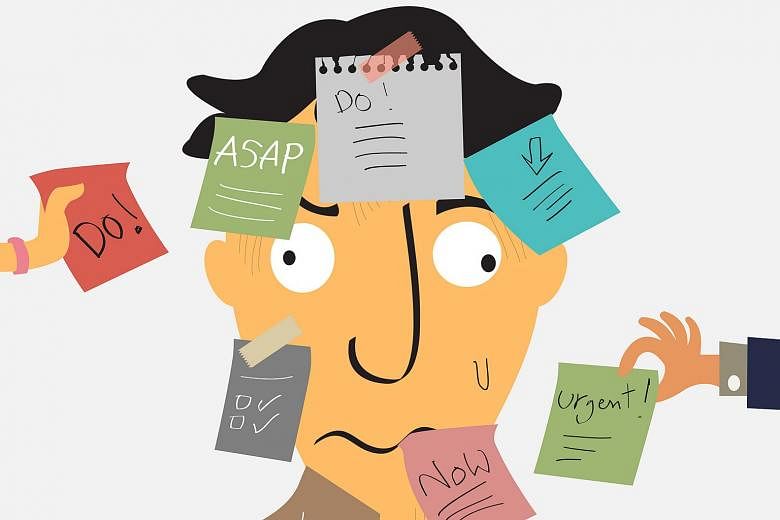First, his fingers, forearms and toes tingled; then he was gripped by a mental paralysis. "I couldn't think about how to make a decision," says the banking executive in his mid- 40s. "I completely froze. I felt my IQ had dropped 50 points." The trigger for his anxiety, he says, was unrealistic work demands. "Not making decisions made it worse, as I was then not performing."
Yet this City worker, who prefers not to be named, tried to conceal his anxiety because he feared his employer would think he was not cut out for the job. The prevailing culture at his office was to keep your head down, work hard, admit no weakness. He wanted to be seen as efficient and resilient. People noticed that his work - rather than his mental health - was suffering. "Given that I have always been pretty much the 'golden boy', when my boss took me to task, I imploded."
Plagued by a fear that he was a fraud, he considered suicide. That was last year.
After receiving psychiatric help, he is now back at work and has become an expert at spotting the signs of anxiety in others. "The characteristics that contribute to stress can also be the reason high achievers have reached their positions - people-pleasing, perfectionism, the need to be strong and to be hyper vigilant to emerging threats," he says.

His case is a stark example of the anxiety and stress that employees experience, and employers are increasingly having to pay attention to. It is a global phenomenon, but in Britain alone the most recent report from the chief medical officer estimates that the number of sick days lost to "stress, depression and anxiety" increased by 24 per cent between 2009 and 2013.
The statistics are alarming: One report from Rotman School of Management in Toronto, published this year, shows that 41 per cent of employees from a range of industries reported high levels of anxiety.
The increase is often blamed on modern working life. The constant buzz of texts, e-mail and tweets mangles our brains and stalks our sleep; robots are in the ascendancy, threatening to steal our jobs. New technologies emerge from left-field to flatten established companies; work appears insecure, corporate ties loose. And expectations of professional life have changed. Work, once the activity we did for money and status, is now supposed to provide personal fulfilment. The upshot? We are afflicted with unease, fear and worry.
"After a decade of disruption, cutbacks and layoffs, anxiety among employees is running very high," says Mr Bill George, a senior fellow at Harvard Business School.
THE DIAGNOSIS
Anxiety is typically described as a feeling of unease, worry or fear. When it becomes acute, the effects can be debilitating. Some people, at different periods in their lives, are more vulnerable to it than others. It is not something we can ever wholly eliminate and it can, at times, be helpful in improving our performance. But too much of it can be corrosive, on occasion leading to alcohol and drug abuse.
Absenteeism is just one problem for employers. The loss of productivity - dubbed "presenteeism" - is another. This occurs when employees come to work but function below par because of ill health. Research suggests this trend predominantly affects white-collar workers and that the costs can be high. One report estimated that presenteeism, including all medical and mental health issues, shaved 2.7 per cent off Australia's gross domestic product in 2010. A study in the Journal Of Applied Psychology, published earlier this year, reported: "Anxiety interferes with people's ability to process immediate events, resulting in lower performance."
In response, companies are introducing programmes to help workers cope better with stress and anxiety. Even in hyper-competitive industries, such as finance or technology, there is increased understanding that attending to their employees' mental well-being may be good for profits.
THE CAUSES
Mr Michael Sinclair, a psychologist in the City of London, sees a "tremendous" number of bankers and lawyers with work-induced anxiety. "They work at a relentless pace," he says. "The pressure is always on and there is a culture of incessant e-mail communication."
But he also believes there is a bigger problem for companies: Such anxiety can be infectious. "A company's fear of failure breeds the same fear among its employees - creating a 'company sickness' and culture of anxiety," says Dr Sinclair. "Ironically, this backfires and impacts the bottom line."
Technology is a contributing factor, says Mr Nigel Jones, a lawyer and co-founder of the City Mental Health Alliance, a non-profit organisation for London's financial services workers. He believes the intensity has increased since he started work 30 years ago.
"Clients want more in terms of speed, quality. There is more pressure at work and the risk of anxiety is higher," he says, adding that 27 City employers have become members of the network within two years. "Expectations of a speedy response to a client have got higher but the expectations of the quality of work have not gone down."
Mr Gianpiero Petriglieri, associate professor of organisational behaviour at Insead Business School, sees the rise of social media as triggering what has become known as "presentation anxiety", making people feel vulnerable. We suffer from "being always on", he says.
Although unemployment in Britain is at a seven-year low, short-term contracts and overall job insecurity have risen for millions of people, from steelworkers to bankers.
Some argue that it is impossible to calculate the impact of changing technology and employment conditions on the rise in reported cases of anxiety. "Trying to directly compare levels of anxiety between eras is a fool's errand," says Mr Scott Stossel, author of My Age Of Anxiety. "Modern poll data and statistics about rising and falling levels of tranquilliser (use) aside, there is no magical anxiety meter that can transcend the cultural particularities of place and time."
RETREAT TO FREELANCING
The answer for some is to take greater control over their work schedules, or become self-employed. But even that can be a double-edged sword, says Mr Barry Schwartz, professor of social theory and social action at Swarthmore College in the US. "There is a dark side to all this freedom from constraint, to all this emphasis on individuals as the makers of their own worlds, their own destinies," he writes. "It leaves people indecisive about what to do and why."
Ms Sara Horowitz, of the Freelancers Union in the United States, told the Financial Times earlier this year: "If you're running health programmes for mine workers, you have to be experts in black lung disease; if you're running them for freelancers, you have to specialise in anxiety."
New gadgets - often introduced as time-saving devices - have always proved unsettling. Ms Brigid Schulte, author of Overwhelmed: Work, Love And Play When No One Has The Time, points out that even the invention of the pencil made some feel that knowledge and information were flowing too fast.
"People feel that time speeds up, that old, familiar ways of living and working are passing and being replaced by something foreign and uncertain," she says.
What is changing is employers' awareness. In 2007, Mr John Binns, a former partner at Deloitte, a professional services firm, experienced severe anxiety and depression: "I'd be looking at my e-mail, assuming if I opened them there would be bad news." A ringing phone also triggered this sense of dread. He says there was no culture of talking about anxiety at work.
Today, he is an independent adviser on mental health to clients including Deloitte. This change reflects wider awareness of the issues and also concern, among employers, about potential litigation from workers. There are additional worries about brand, reputation and even recruitment for companies with a poor record on mental illness.
PREVENTIVE MEASURES
Employee programmes, focused on the mental well-being of workers, have expanded greatly in scope - from financial support to counselling helplines. According to a report on the sector by Ibisworld, a market research company, over the past 20 years the number of US businesses running such schemes has more than doubled to 74 per cent. Consultants, hired by employers worried about lost productivity, are part of an informal industry that has sprung up to quell workplace anxiety and stress.
Mindfulness - according to its proponents the awareness that emerges from studying the unfolding of experience moment by moment - is no longer solely practised by Buddhist monks and their followers but espoused by chief executives. Google, Apple and Sony are among the companies to have adopted mindfulness programmes to encourage employees to meditate and focus - and make them more productive and satisfied in their work. Resilience is another term that has gained traction among employers.
Digital detoxing consultants advise employees on how to stop being distracted by e-mail, texts and Twitter. They offer retreats for frazzled executives, such as the US' Camp Grounded, or advisers who work with employees to instil good tech practice.
It would, however, be wrong to overstate the corporate help available. The Chartered Institute of Personnel and Development found recently that only 60 per cent of organisations in Britain were taking steps to identify and reduce stress in the workplace.
The risk is always that well-being initiatives become "tickboxing exercises" created by human resources managers. Departments committed to promoting robust mental health may contradict the day-to-day reality for colleagues. Moreover, programmes can backfire as employees become anxious about failing at being mindful.
"If you're offering mindfulness classes or wellness programmes, that's like saying the reason for the anxiety rests with the worker, so the solution should be up to the worker, too. That's really unfair," says Ms Schulte, who argues that many corporate programmes miss the point. "Yes, give people the tools to manage stress and anxiety. But leaders and companies need to recognise their part in this, too."
Company guidelines on switching off technology, for example, can relieve individuals of the responsibility for refusing to answer late-night e-mail.
Encouraging employees to share their experiences is also important. The City Mental Health Alliance hopes that getting senior bankers and lawyers to speak about their anxieties might stop others from being reluctant to seek help.
"People think everyone else is immune to all these feelings," says Mr Binns. "Many very successful people suffer from anxiety. There is a long way to go before the association with weakness is dealt with."
The bank worker - who now watches out for signs of anxiety in others - is far less optimistic. Hard-working professionals wear stress as a badge of honour and no one admits to anxiety, he says.
"I speak to people when I see the signs. I will find the right time, tone and place and bring it up," he says. "But it's hard for people to talk about it and we need to make it easier."
FINANCIAL TIMES

